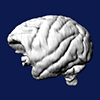-
-
sample data

|
-
-
-
sample data

|
-
sample publication

|
|
Macaque monkey retrosplenial cortex: II. Cortical afferents.
J Comp Neurol. 2003 Nov 3;466(1):48-79. Kobayashi Y, Amaral DG.
We investigated the cortical afferents of the retrosplenial cortex and the adjacent posterior cingulate cortex (area 23) in the macaque monkey by using the retrograde tracers Fast blue and Diamidino yellow. We quantitatively analyzed the distribution of labeled neurons throughout the cortical mantle. Injections involving the retrosplenial cortex resulted in labeled neurons within the retrosplenial cortex and in areas 23 and 31 (approximately 78% of the total labeled cells). In the remainder of the cortex, the heaviest projections originated in the hippocampal formation, including the entorhinal cortex, subiculum, presubiculum, and parasubiculum. The parahippocampal and perirhinal cortices also contained many labeled neurons, as did the prefrontal cortex, mainly in areas 46, 9, 10, and 11, and the occipital cortex, mainly area V2. Injections in area 23 also resulted in numerous labeled cells in the posterior cingulate and retrosplenial regions (approximately 67% of total labeled cells). As in the retrosplenial cortex, injections of area 23 led to many labeled neurons in the frontal cortex, although most of these cells were in areas 9 and 46. Larger numbers of retrogradely labeled cells were also distributed more widely in the posterior parietal cortex, including areas 7a, 7m, LIP, and DP. There were some labeled cells in the parahippocampal cortex. These connections are consistent with the retrosplenial cortex acting as an interface between the working memory functions in the prefrontal areas and the long-term memory encoding in the medial temporal lobe. The posterior cingulate cortex, in contrast, may be more highly associated with visuospatial functions.
Neuroanatomical Connectivity References
|
|

